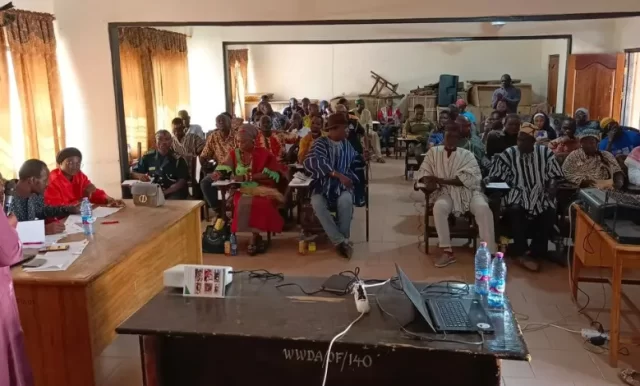The Capacity Enhancement and Community Support (CAPECS), a prominent non-governmental organisation based in the Upper West Region, has officially launched a new initiative aimed at enhancing community resilience and inclusion in the Wa West District.
The project, titled Driving Resilience and Inclusion Against Violent Extremism (DRIVE), is being implemented in partnership with the European Union.
The project was formally introduced during an inception meeting held on December 17, 2024, at the Wa West Municipal Assembly. The gathering, which included key stakeholders such as chiefs, queen mothers, and heads of various departments, served as a platform to outline the project’s objectives, strategies, and planned activities. It also provided an opportunity to rally local support for its successful and impactful implementation.
Speaking at the event, CAPECS Monitoring and Evaluation Adaptation Learning Officer Sinto Mustapha Nuhu emphasized the organisation’s commitment to empowering vulnerable and excluded groups. He outlined the evolution of CAPECS, originally known as the Center for the Alleviation of Poverty, Environment, and Child Support before its rebranding in 2017 to reflect its expanded focus on capacity building and community support.
“Our mission is to empower vulnerable groups by creating environments where they can realise and exercise their potential,” Nuhu explained.
The DRIVE project aims to address growing security and developmental threats, particularly the rise of violent extremism that has affected parts of the Sahel region. Nuhu expressed concern about the influence of extremist groups, which exploit local vulnerabilities such as porous borders and ongoing conflicts related to chieftaincy, land, and farmer-herder disputes.
“Violent extremist groups continue to exploit community vulnerabilities, including porous borders and existing local conflicts. This project will empower local actors to foster peace and resilience through participatory governance and social cohesion,” Nuhu stated.
The initiative will focus on building peace and social cohesion, improving gender equality and social inclusion (GESI), and enhancing human security through participatory governance. A key aspect of the project will involve engaging local leaders and stakeholders, particularly traditional authorities, to institutionalise inclusive practices and ensure the long-term sustainability of the initiative.
As part of the project’s implementation, CAPECS plans to conduct training sessions targeting a wide range of local actors, including assembly staff, decentralised departments, community leaders, and minority groups. These sessions, scheduled between January and June 2025, will provide the necessary tools to foster inclusive governance practices and promote community-driven solutions to security challenges.
Nuhu stressed the importance of local ownership, urging stakeholders, especially traditional leaders and local government representatives, to fully commit to the project’s goals. “For DRIVE to succeed, it is essential to institutionalise inclusive governance practices that will make these initiatives sustainable,” he asserted.
CAPECS, with a proven track record of spearheading transformative community projects in the region, has previously led successful initiatives in areas such as women’s empowerment, health advocacy, and social inclusion. Notable past efforts include the Mobilising for Peace and Cohesion project and the Livelihood for Cohesion initiative. The organisation has also developed community bylaws to address conflicts between farmers and herders, fostering sustainable solutions for peaceful coexistence.
As the DRIVE project takes shape, it represents a significant step forward in the fight against violent extremism in the Upper West Region, while strengthening community resilience and inclusion in the Wa West District.
Send your news stories to newsghana101@gmail.com
Follow News Ghana on Google News

















